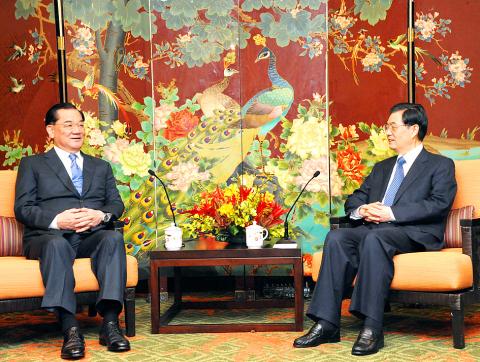|
DPP lashes out at
Lien-Hu APEC talks
TOO FAR: Lien Chan raised the issue of a
cross-strait peace pact during the meeting, which the DPP said showed that
negotiations on such an accord have already started
By Lin Shu-hui / Staff Reporter, with CNA, Taipei and Honolulu

Chinese President Hu Jintao,
right, talks with Taiwan’s APEC envoy Lien Chan during the APEC forum in
Honolulu, Hawaii, yesterday.
Photo: AFP
President Ma Ying-jeou’s (馬英九) APEC envoy,
Lien Chan (連戰), yesterday discussed the idea of signing a cross-strait peace
agreement during a meeting with Chinese President Hu Jintao (胡錦濤), drawing
criticism from the Democratic Progressive Party (DPP), which said this
constituted a violation of Ma’s “10 guarantees.”
During his 55-minute meeting with Hu in Honolulu, Hawaii, prior to the main APEC
leaders’ summit scheduled for yesterday and today, Lien put forward the issue of
signing a cross-strait peace agreement, saying he hoped both sides “could start
to exchange views on the peace issue.”
Lien expressed the hope that both sides could review the issue in due time, but
that this should be a more long-term goal.
In Taipei, the Democratic Progressive Party (DPP) criticized Lien, saying his
remarks suggested that “Ma’s ‘10 guarantees’ are a lie.”
The DPP was referring to the “10 guarantees” Ma gave late last month that
include “one framework, two prerequisites, three principles and four assurances”
that he said would need to be in place before Taiwan would consider working
toward a peace accord with China.
DPP spokesperson Chen Chi-mai (陳其邁) said Lien should have focused his talks with
Hu on issues relating to international trade.
“That Lien broached the [peace agreement] issue with Hu shows that the Chinese
Nationalist Party [KMT] has already started to negotiate with the Chinese
Communist Party [CCP] on the peace accord behind closed doors,” Chen said.
Noting that Ma had initially included negotiating a peace accord in his “golden
decade” policy, but then later said a peace accord would not need to be limited
to a decade, Chen added: “After Lien’s meeting with Hu yesterday, it seems that
the negotiations aren’t going to take a decade as Ma said they would: They have
already started. Ma has already started negotiations on a peace accord.”
Saying that since the annual KMT-CCP summit began in 2005 and a Lien-Hu
communique was signed, which included a point on resuming cross-strait
negotiations to achieve peace, Chen said: “Ma’s unilateral decision to use the
results of the 2005 KMT-CCP closed-door negotiations as the guiding principle to
negotiate a peace accord with China is using the will of one person and one
party to decide the fate of the country.”
“The move is pushing Taiwanese toward fear and an uncertain future,” he said,
adding: “Ma should tell us what he’s worried about and explain why his
cross-strait policies are so contradictory and rash.”
During the Lien-Hu meeting yesterday, the two also touched on the so-called
“1992 consensus.” Hu said both sides should stick to the consensus and safeguard
the peaceful development of cross-strait ties, while Lien said the consensus is
the basis for the peaceful development of cross-strait relations and the
cornerstone of cross-strait trade benefits and prosperity.
Lien also urged China to speed up negotiations on a cross-strait investment
protection agreement and follow-up issues relating to the cross-strait Economic
Cooperation Framework Agreement.
According to Lien, Hu acknowledged the complex nature of the issues and said
that they would be resolved one by one.
Additional reporting by Rich Chang
Translated by Jake Chung, Staff writer
|
![]()
![]()
![]()